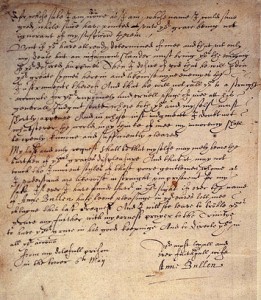 On this day in history, 6th May 1536, four days after her arrest, Queen Anne Boleyn may have written a letter to her husband, Henry VIII.
On this day in history, 6th May 1536, four days after her arrest, Queen Anne Boleyn may have written a letter to her husband, Henry VIII.
She was of course imprisoned in the Tower of London at this time and the letter has been given the title, possibly added by Thomas Cromwell, “To the King from the Lady in the Tower”.
In this letter, the queen emphasises her innocence and asks the King to “let not any light Fancy, or bad Counsel of mine Enemies, withdraw your Princely Favour from me”. She also asks for a “lawful trial” and puts her present predicament down to the King’s affection settling on another, i.e. her own lady-in-waiting, Jane Seymour.
You can read the full text of this letter and read about author Sandra Vasoli’s research on it and her views on its provenance in Sandi’s article from last year – click here – and Sandi also made this video for last year’s MadeGlobal Publishing Anne Boleyn Day:
You can, of course, find out more about Sandi’s research in her book Anne Boleyn’s Letter from the Tower: A New Assessment – click here.
